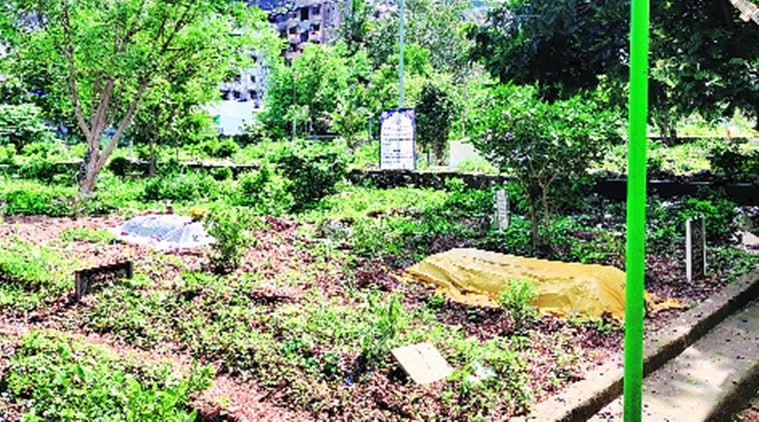 Jamiat-ul-Muslimeen cemetery has space left to bury only 40 bodies. (Express Photo)
Jamiat-ul-Muslimeen cemetery has space left to bury only 40 bodies. (Express Photo)
A banner outside the Jamiat-Ul-Muslimeen cemetery in Mumbra, overburdened by a sudden spike in burials, states it has to shut down due to lack of space. Hanif Shaikh, the chairman of the kabrastan, said there is space left for only 40 bodies to be buried. A kilometre away, Kausa Jama Masjid cemetery is seeing a similar spike in burials.
As the Covid-19 situation is gradually stabilising in Mumbai, its satellite townships, including Thane, have witnessed a spike in both the number of cases and deaths. The worst hit have been the ghettoised areas of Mumbra and Kausa in Thane.
“On an average, we would have 55 burials at our cemetery. Since the virus broke out, the numbers are increasing,” Shaikh said. The cemetery recorded 74 burials in March, 91 in April, 160 in May and 173 until June 23. At Kausa cemetery, trustee Liyaqat Dhole said there would be 150 to 180 burials per month before the Covid-19 pandemic. The cemetery recorded 63 burials in March, 82 in April, 240 in May, and 207 until June 23.
Put together, these two cemeteries have carried out 780 burials over the last two months.
Government data, however, showed that Kausa and Mumbra have reported 107 Covid-19 deaths until June 24. The official number of Covid-19 deaths, and the apparently high number of bodies being laid to rest over the last two months, has led BJP former MP Kirit Somaiya to claim that the Thane Municipal Corporation (TMC) has been hiding the actual toll.
TMC, which has jurisdiction over Mumbra and Kausa, is recording a weekly growth rate 20 per cent in Covid-19 cases, as opposed to Mumbai, which is at 12.8 per cent. The corporation saw a change of guard on Tuesday with Vipin Sharma being posted as the new commissioner.
TMC has officially recorded 251 deaths and 7,900 cases till Wednesday – a jump of 219 per cent in cases from 2,405 on May 24. The corporation has 6,000 isolation beds, 212 intensive care units and 100 ventilators for a population of 10 to 12 lakh. It is in the process of adding 1,000 more beds. Kausa set up a Covid care centre in May, two months after the pandemic began. But experts said the infrastructure is inadequate to support rising number of cases.
“Poor health infrastructure has forced people to go to hospitals in Mumbai or die at home,” said local resident Khalid Jehangir.
Ayub Shaikh (69) who died at home on May 8, tested positive hours after his death. His son Ibrahim said Ayub developed fever on May 2, and was treated by a private doctor for three days. By May 7, his health worsened, an X-ray showed pneumonia, and he was tested for Covid-19. “He could not breathe. I called so many hospitals, all said they need a Covid-19 report to admit him.” He died before the report from the private laboratory could arrive. He was buried in the Kausa cemetery.
A delay in contact tracing is also a factor leading to the spike in cases. TMC is tracing eight to 10 high-risk people per infected person, said Dr Ramrao Kendre, TMC medical officer. He said the mandate is changing to now aggressively trace at least 20 low-risk contacts as well. Currently, low-risk contacts, like the vendors or grocery shopowners who might have had interactions with a patient, are not being traced.
Ayaz Gulbar, who lost his wife Ameena (47) and brother Mansoor (47) to Covid-19 in a gap of three days last month, said “there was delay in treatment provided by the administration”.
The two from Gulbar family died at Kalsekar hospital – the only dedicated Covid-19 hospital in the area. It has 126 beds, 43 ICUs and eight ventilators.
“I was stranded in Khopoli and could not return home due to the lockdown. My son was managing here. He said there was no communication by TMC on the health of my wife and brother. He had no idea what treatment was being given at the hospital. They were admitted very late,” Gulbar said. His wife died on May 24, and brother three days later.
“Our ICUs and ventilators are always full. We try to manage patients on oxygen, but we have to refer two to five patients to other centres every day,” a medical officer in the hospital said.
Dr Arun Patekar, medical officer of the Mumbra health clinic said “participation from local residents remains poor, resulting in delayed detection of cases”. “We had been working tirelessly for three months, but with eight to 10 members residing in small flats and poor sanitation, controlling the virus spread is difficult.”
A medical officer in Kausa said they are overburdened with clerical work and have to cater to a huge population with limited resources. “If a patient tests positive, I have to call an ambulance, arrange a hospital bed and also perform contact tracing. We have a war room for this task but there is hardly any coordination,” the officer, in charge of a 5.5 lakh people, said.
Kausa medical officer Dr Hemangi Ghode said she is aware of the high number of bodies being buried in cemeteries but “has to investigate” why the number of deaths have increased. “Not all deaths are due to Covid-19… it could be due to various reasons,” she added.